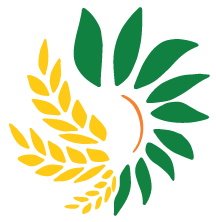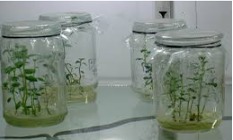Potato Tissue Culture
What is a Potato?
The potato is a root vegetable native to the Americas, a starchy tuber of the plant Solanum tuberosum, and the plant itself, a perennial in the family Solanaceae. Today they are a staple food in many parts of the world and an integral part of much of the world’s food supply. As of 2014, potatoes were the world’s fourth-largest food crop after maize (corn), wheat, and rice.
Following millennia of selective breeding, there are now over 1,000 different types of potatoes.
Potato cultivation in India started after the Portuguese started farming it in the 17th Century in Western India.
The importance of the potato farming as a food source and culinary ingredient varies by region and is still changing. It remains an essential crop in Europe, especially Northern and Eastern Europe, where per capita production is still the highest in the world, while the most rapid expansion in production over the past few decades has occurred in southern and eastern Asia, with China and India leading the world in overall production as of 2014.
Cultivation of potato in India is widespread. In the central plains of India such as Madhya Pradesh, Gujarat and Orissa, potato is a winter or rabi crop. Therefore, the time of planting here is during the months of October and November.
Potato can be both kharif and rabi crop in the Deccan plateau, i.e., in states like Andhra Pradesh, Karnataka and Maharashtra. In other words, two crops of potatoes can be grown in these regions- from mid-June to mid-July and then during October and November.
In the southern plains, potatoes are grown throughout the year during summer, autumn and spring. In other words, they are cultivated during April/May, August/September and January.
Why Potatoes?
Potatoes are stuffed with phytonutrients, which are organic components of plants that are thought to promote health, according to the USDA. Phytonutrients in potatoes include carotenoids, flavonoids and caffeic acid.
The vitamin C in potatoes is an antioxidant. They prevent or delay some types of cell damage, according to the National Institutes of Health. They also help with digestion, heart health, blood pressure and even cancer prevention.
The B6 vitamins in potatoes are critical to maintaining neurological health. Vitamin B6 helps create brain chemicals including serotonin, dopamine and norepinephrine, according to the University of Maryland Medical Center. This means that eating potatoes may help with depression, stress and even perhaps attention deficit hyperactivity disorder (ADHD).
Potatoes’ high level of carbohydrates has some advantages, including helping maintain good levels of glucose in the blood, which is necessary for proper brain functioning. A 1995 study published in the American Journal of Clinical Nutrition found that modest increases in glucose could help enhance learning and memory. Potassium, which encourages the widening of blood vessels, also helps ensure your brain gets enough blood.
What is Plant Tissue Culture?
Plant tissue culture refers to a set of techniques which are used to grow or maintain a set of plant cells or tissues under sterile conditions on a nutrient culture medium of known composition. It is widely used to produce clones of a plant in a method known as micropropagation. Different techniques in plant tissue culture may offer certain advantages over traditional methods of propagation, including:
- The production of exact copies of plants that have certain desirable traits.
- To quickly produce mature plants.
- The production of multiple plants without seeds or necessary pollinators to produce seeds.
- The regeneration of whole plants from plant cells that have been genetically modified.
- The production of plants in sterile containers that allows them to be moved with greatly reduced chances of transmitting diseases, pests, and pathogens.
- To clear particular plants of viral and other infections and to quickly multiply these plants as ‘cleaned stock’ for horticulture and agriculture.
Why Potato Tissue Culture?
Potato cultivation is prone to diseases such as Bacterial wilt, Septoria leaf spot, Late blight, Early blight and so on.
Bacterial Wilt is caused by pseudomonas solanacearum. The most common symptom of the disease is sudden wilting of the plant. Affected plants show droopy appearance and the branches gradually turn bronze and die. There is some unusual browning of vascular bundles in the stem and tubers show a brown ring inside. Eyes of tubers are also blackened.
Aphids are small insects, either pale yellow or dark in colour. Both nymph and adult damage the plant by sucking the cell sap from the leaves, tender shoots and stem. The leaves of attacked plants become yellowish and they lose vitality. Besides this, aphids secrete honey-dew on the leaves on which black mould develops. This interferes with photosynthesis. The winged aphids also transmit serious viral diseases in this crop.
To help solve this problem, we at Hybrid Agri use Tissue Culture Techniques to not only protect your yield from such diseases, but also help you maximize the yield using our cutting-edge technology.
What is Hybrid Agri’s Role?
Potato farming in India has seen major growth in the last few decades. We at Hybrid Agri Pvt Ltd, are among the top tissue culture potato suppliers in India. We will not only help you protect your yield from such plant diseases, but also help you maximize your output using our cutting-edge tissue culture technologies. We develop the potato tissue culture plants in sterile containers as a protection from pests and pathogens, as well as for convenience in transportation.
Our potato tissue culture plants not only give better yields than conventionally raised potato crops, but also grow to maturity in considerably less time.The tissue culture technique employed by us provides us the opportunity to maintain the optimum growth conditions, thereby resulting in uniform growth of plants. All of this enables us to produce disease-free and healthy plants which ultimately results in increased profitability


 WhatsApp us
WhatsApp us